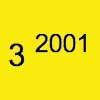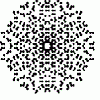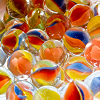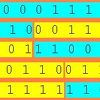Number theory
-

-
 problem
problemNovemberish
a) A four digit number (in base 10) aabb is a perfect square. Discuss ways of systematically finding this number. (b) Prove that 11^{10}-1 is divisible by 100. -
 problem
problemStrange Numbers
All strange numbers are prime. Every one digit prime number is strange and a number of two or more digits is strange if and only if so are the two numbers obtained from it by omitting either its first or its last digit. Find all strange numbers. -
 problem
problemMarbles
I start with a red, a green and a blue marble. I can trade any of my marbles for two others, one of each colour. Can I end up with five more blue marbles than red after a number of such trades? -
 problem
problemNever Prime
If a two digit number has its digits reversed and the smaller of the two numbers is subtracted from the larger, prove the difference can never be prime. -
 problem
problemDiophantine N-Tuples
Can you explain why a sequence of operations always gives you perfect squares? -
 problem
problemMore Marbles
I start with a red, a blue, a green and a yellow marble. I can trade any of my marbles for three others, one of each colour. Can I end up with exactly two marbles of each colour? -

-
 problem
problemThe Public Key
Find 180 to the power 59 (mod 391) to crack the code. To find the secret number with a calculator we work with small numbers like 59 and 391 but very big numbers are used in the real world for this. -
 problem
problemData Chunks
Data is sent in chunks of two different sizes - a yellow chunk has 5 characters and a blue chunk has 9 characters. A data slot of size 31 cannot be exactly filled with a combination of yellow and blue chunks, explore what sizes near to 31 can, or cannot, be exactly filled.
